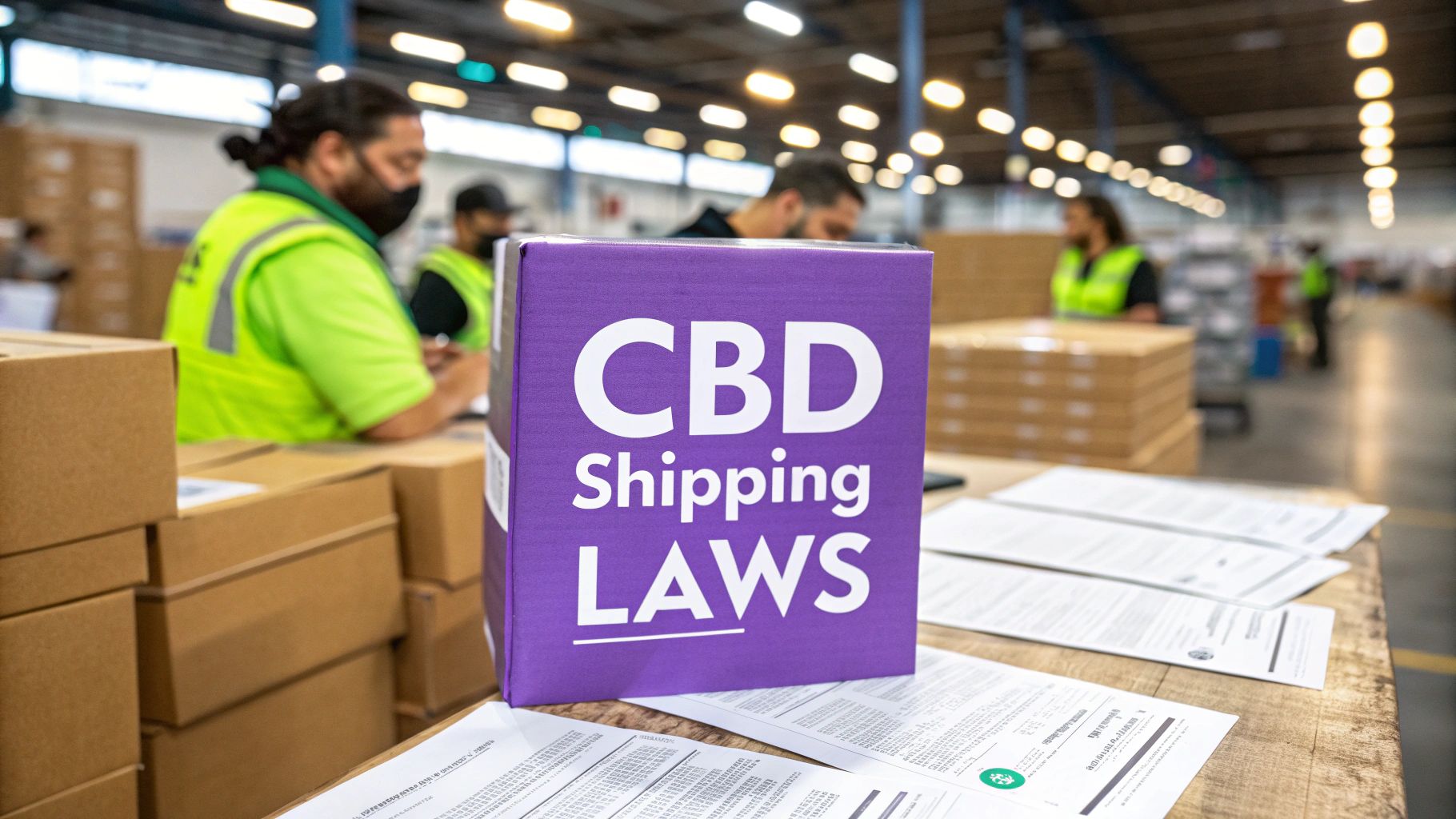
CBD/Hemp/THCA Shipping Laws Michigan: Your Essential Guide
Stay compliant with CBD/Hemp/THCA Shipping Laws Michigan. Learn key regulations and navigate Michigan’s shipping laws with confidence and clarity.
Cody Y.
Updated on Oct 19, 2025
Trying to ship CBD, hemp, or THCA products into Michigan can feel like navigating a legal minefield. But if you remember one core rule, you’re already halfway there: Michigan treats potentially intoxicating products like THCA as marijuana, regardless of whether they come from hemp.
This single distinction is the key. It means your e-commerce business has to play by Michigan’s strict state-level rules, not just the broader federal guidelines.
Your Guide to Michigan's Complex Hemp Shipping Rules
To understand the shipping landscape in Michigan, you have to separate federal permissions from state prohibitions. The 2018 Farm Bill cracked the door open for hemp products across the country by defining legal hemp as cannabis with less than 0.3% Delta-9 THC.
But that federal law is just the starting point. Think of it as a national guideline; states have every right to enforce their own, often stricter, rules. Michigan is a perfect example of a state doing just that.
The state’s Cannabis Regulatory Agency (CRA) has its own rulebook, adding a thick layer of complexity for online sellers. If you're shipping into the Great Lake State, just being federally compliant isn't enough.
The Key Distinctions You Must Know
This guide will serve as your roadmap, breaking down the essential regulations into clear, actionable steps. We’ll cover the critical areas to keep your business on the right side of the law:
- Federal vs. State Law: We'll dive into the major differences between the 2018 Farm Bill and Michigan’s specific regulations, showing exactly why state law wins when it comes to intoxicating cannabinoids.
- The PACT Act's Impact: A close look at how this federal law creates a blanket ban on shipping all vape products via USPS—a massive roadblock for many online stores.
- Actionable Compliance Steps: We'll give you a practical, no-nonsense checklist for staying compliant when you ship to customers in Michigan.
The infographic below boils down the most important takeaways from Michigan's hemp shipping laws at a glance.
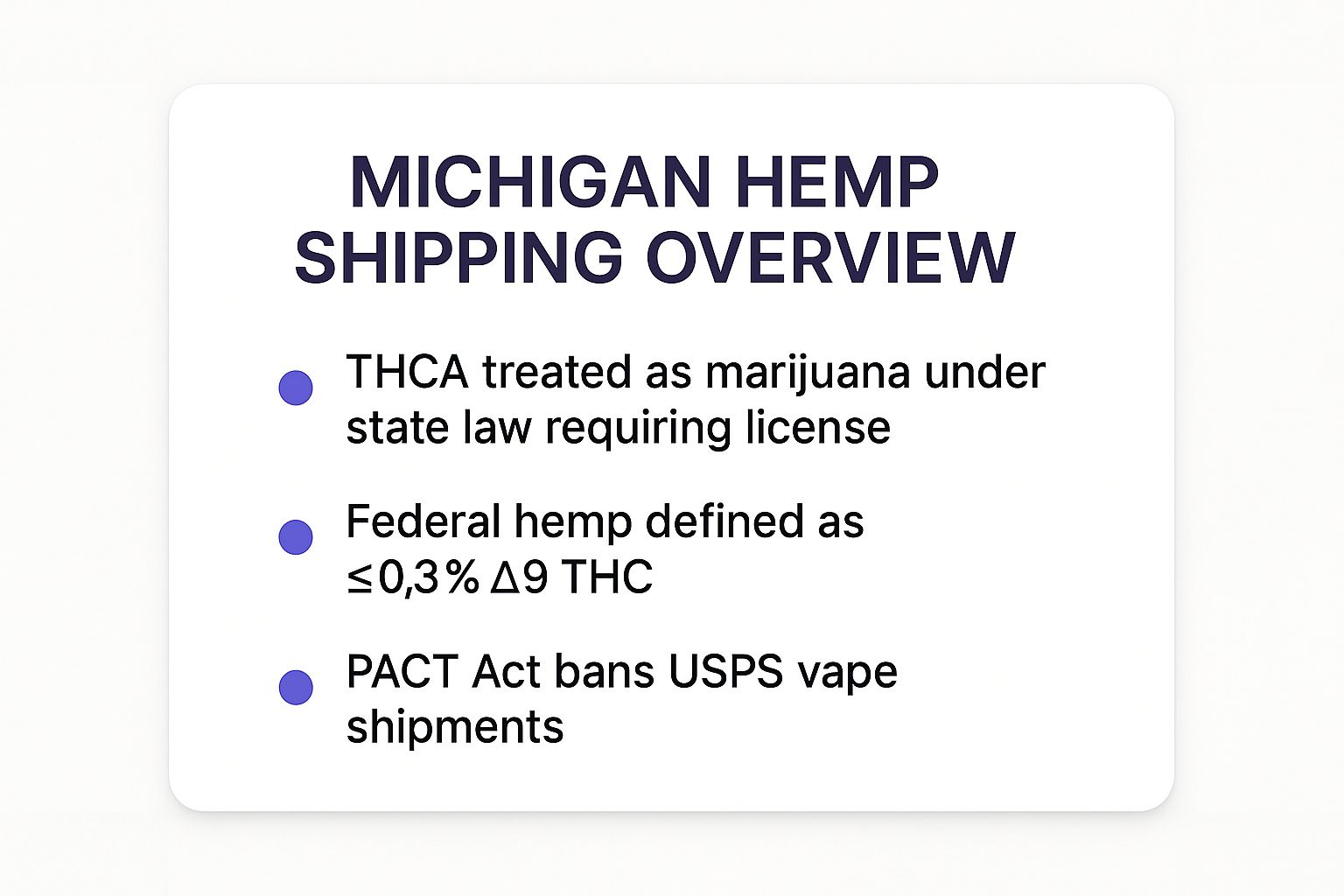
As you can see, the situation is layered. Federal law looks at Delta-9 THC, Michigan state law reclassifies THCA as regulated marijuana, and the PACT Act adds its own total ban on vape shipments.
For a quick reference, here's a summary of where different products stand for shipping into Michigan.
Michigan Cannabinoid Shipping Status at a Glance
This table provides a quick summary of the legality and shipping restrictions for different hemp-derived products in Michigan.
| Product Type | Federal Status (2018 Farm Bill) | Michigan State Status | General Shipping Eligibility |
|---|---|---|---|
| CBD (Non-Intoxicating) | Legal if <0.3% D9 THC | Legal | Allowed |
| THCA Products | Legal if <0.3% D9 THC | Regulated as Marijuana | Prohibited to ship to consumers |
| Delta-8 THC | Legal if <0.3% D9 THC | Regulated as Marijuana | Prohibited to ship to consumers |
| Hemp Vape Products | Legal if <0.3% D9 THC | Legal (Non-intoxicating) / Regulated (Intoxicating) | Prohibited via USPS (PACT Act) |
Navigating these rules requires careful attention to both the product type and the shipping method, as federal and state laws create a complex web of restrictions.
Michigan's Strict Stance on THCA
Michigan has taken a firm, proactive stance on hemp-derived cannabinoids. As of 2025, the state treats products containing hemp-derived THC and tetrahydrocannabinolic acid (THCA) exactly the same as marijuana under state law.
This isn't a new development. The state signaled its direction back in 2021 when it first regulated Delta-8 THC under its marijuana laws. The 2025 expansion simply brought all other intoxicating cannabinoids from hemp under that same umbrella.
This approach creates a challenging legal environment where state authority makes e-commerce tricky. To see how Michigan's laws compare to the rest of the country, check out our complete CBD shipping laws by state guide. This resource helps put Michigan's unique rules into the broader national context.
Successfully navigating these rules is the only way to protect your business while legally serving your customers.
Understanding Federal vs. Michigan State Hemp Laws
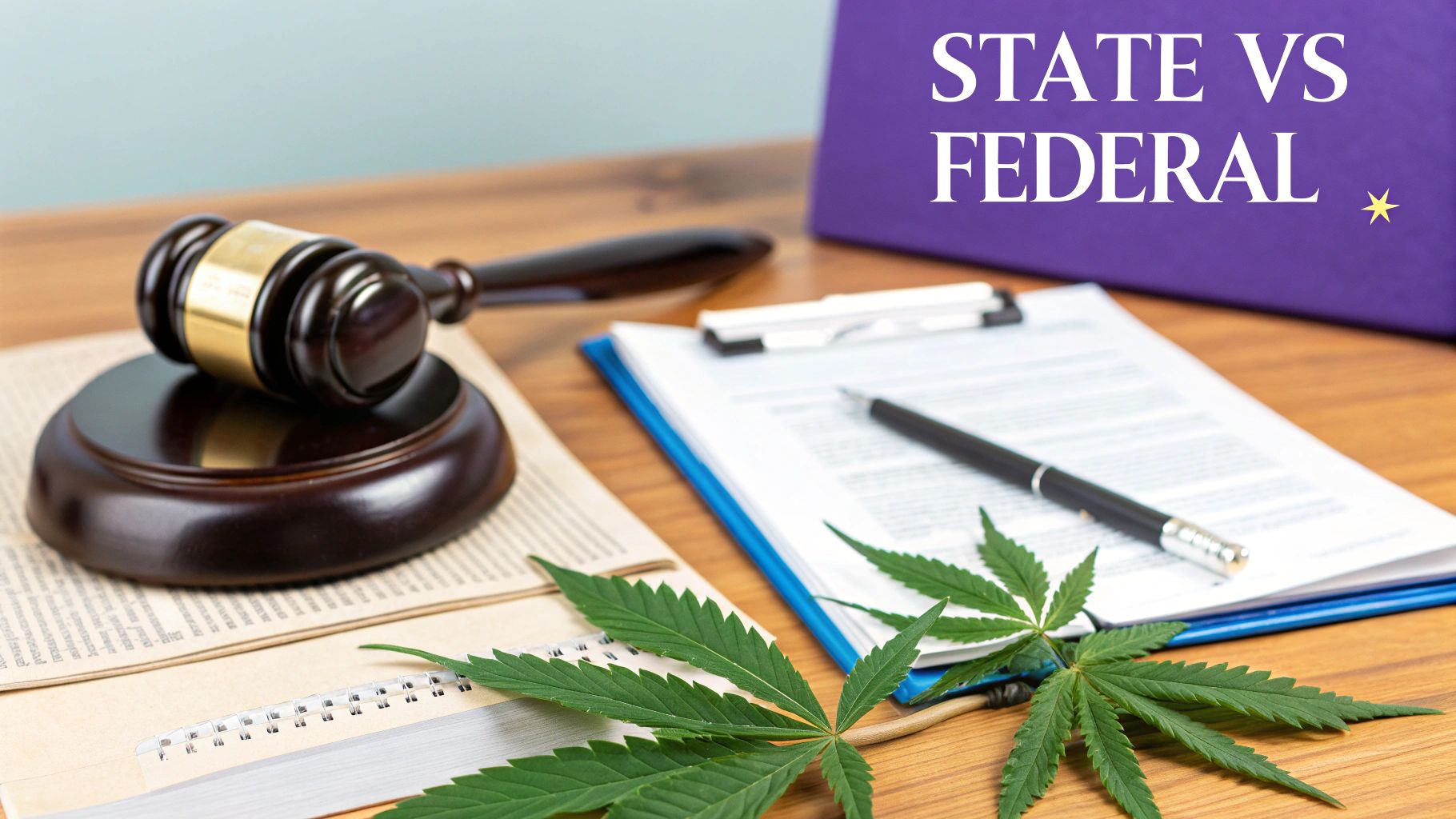
It’s one of the most common and costly mistakes in the industry: assuming federal law is the final word on hemp. For any business shipping to Michigan, that assumption can get products seized and land you in serious legal trouble. You have to understand that federal and state laws are two distinct layers of rules—and you must comply with both.
The story starts at the federal level with the 2018 Agriculture Improvement Act, better known as the Farm Bill. This was landmark legislation. It carved out a legal path for hemp across the country by defining it as any part of the cannabis plant with a Delta-9 THC concentration of 0.3% or less on a dry weight basis.
This single definition blew the doors open for products from CBD oils to THCA flower, all of which were now technically "hemp" under federal law. But the Farm Bill didn't create a free-for-all. It gave states the explicit power to regulate hemp inside their own borders and even be more strict if they chose to.
How Michigan Adds Its Own Layer of Rules
This is where things get tricky, and it's the core of CBD/Hemp/THCA shipping laws in Michigan. While the federal government draws a clean line at the 0.3% Delta-9 THC mark, Michigan looks at the bigger picture: what a product actually does.
Think of it like highway speed limits. The feds might set a national guideline, but each state puts up its own signs with its own numbers. When you're driving in Michigan, you follow Michigan's signs, not some theoretical national standard.
The authority setting those local rules is Michigan’s Cannabis Regulatory Agency (CRA). The CRA has made it clear that any cannabinoid that is intoxicating—or can become intoxicating, like THCA—is considered "marihuana" under state law.
Key Takeaway: In Michigan, the potential of a product to get someone high matters more than its technical federal classification. If it's intoxicating, the state treats it as marijuana, and it must be sold through the licensed system.
This means a THCA product with less than 0.3% Delta-9 THC is perfectly legal hemp federally. But in Michigan, it's considered illegal marijuana if you sell it outside of a licensed dispensary.
The Critical Difference Between Hemp and Marijuana
Nailing down the distinction Michigan makes is everything. Federal law drew a simple, technical line based on one specific cannabinoid, but Michigan’s rules are all about a product's real-world effect. To get a deeper look at how these classifications affect shipping, check out our guide on the critical shipping law differences between hemp and marijuana products.
Here's how the two legal frameworks see a product like THCA flower:
- Federal View (2018 Farm Bill):
- Main Question: Is the Delta-9 THC over 0.3%?
- Result for THCA: If the Delta-9 THC is below the line, it’s legal hemp. Simple as that.
- Michigan State View (CRA Regulations):
- Main Question: Is this stuff intoxicating, or can it become intoxicating (like THCA)?
- Result for THCA: Yes, it’s a direct precursor to THC. That makes it marijuana, and it can only be sold through state-licensed channels.
Why Federal Compliance Is Not Enough
This creates a clear pecking order: state law trumps federal guidelines for any sale inside Michigan. Your entire business operation has to be built around Michigan's specific framework for any product the state deems intoxicating.
Trying to rely only on the Farm Bill is a recipe for disaster. We've seen out-of-state businesses argue that federal law gives them the right to ship hemp anywhere. But time and again, courts have backed a state's right to enforce its own, stricter rules.
Bottom line: when you ship to a customer in Michigan, you are playing by Michigan's rules. Your compliance strategy has to be built around the CRA's definitions, not just the federal ones. This is the bedrock concept behind all CBD/Hemp/THCA shipping laws in Michigan.
How the PACT Act Grounds Hemp Vape Shipments
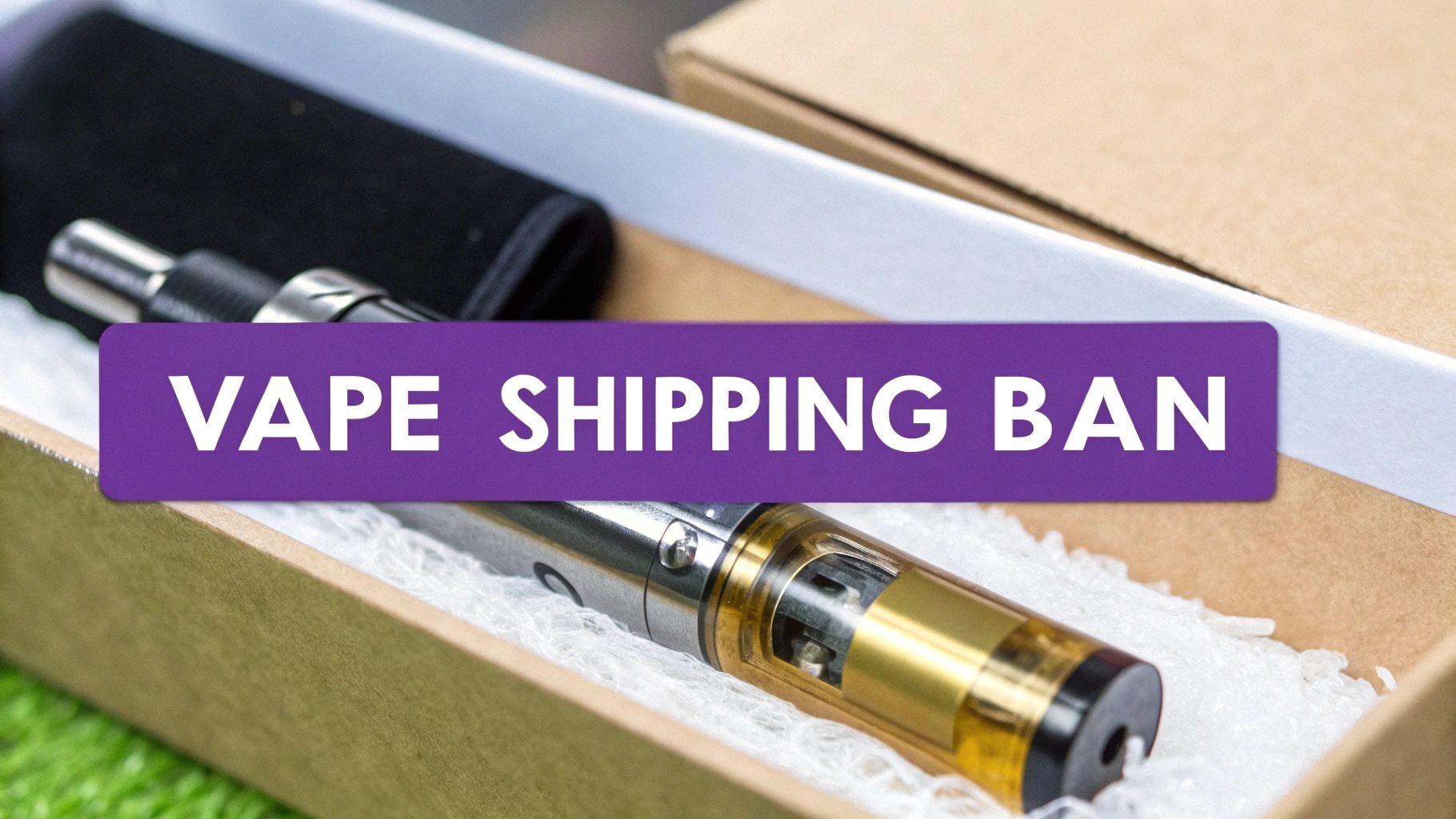
If you’ve ever tried shipping hemp vape cartridges to a customer in Michigan, you’ve probably hit a brick wall. That frustrating roadblock isn't a state-specific ban from Lansing; it’s a sweeping federal law that completely changed the game for the entire industry. It’s called the Prevent All Cigarette Trafficking (PACT) Act.
Originally passed way back in 2009 to crack down on illegal online cigarette sales, the PACT Act was a powerful tool against tobacco tax evasion. For over a decade, it had almost nothing to do with the booming hemp market.
But that all changed in 2021 when Congress quietly amended the Act. They expanded the definition of a "cigarette" to include all Electronic Nicotine Delivery Systems (ENDS)—a deceptively broad term that created a massive ripple effect far beyond just nicotine.
The Expansion That Changed Everything
The new language defined an ENDS product as any device that delivers a solution to the user through an aerosolized liquid. This wasn't just about the device itself; it included "any component, liquid, part, or accessory... without regard to whether the component, liquid, part, or accessory is sold separately."
And here's the crucial part: the definition applies whether the product contains nicotine or not.
This seemingly small detail was a bombshell for the hemp industry. Overnight, every single CBD, Delta-8, and THCA vape pen, cartridge, and e-liquid was reclassified under federal law. They were now treated just like a pack of cigarettes for all shipping purposes.
The result? It slammed the door shut on using the United States Postal Service (USPS) for most direct-to-consumer vape shipments.
The PACT Act's expansion created a nationwide shipping prohibition that affects all states equally. This isn't just about Michigan; it’s a federal mandate that makes shipping vape products directly to consumers nearly impossible for e-commerce brands.
Since October 2021, the USPS has enforced a final rule that flat-out prohibits mailing ENDS products—which now includes all hemp and CBD vape items—directly to consumers.
What About Private Carriers like FedEx and UPS?
With the USPS off the table, many businesses scrambled to find a workaround with private carriers. Unfortunately, they found no relief there, either.
While the PACT Act specifically restricts the USPS, carriers like FedEx and UPS quickly updated their own internal policies to get in line with the spirit of the federal law. They took a firm stance, broadly prohibiting the shipment of all vaping products to residential addresses, regardless of what's inside them.
This created a near-total blockade for online sellers. The few exceptions that exist are typically reserved for heavily vetted business-to-business (B2B) shipments that require a mountain of compliance paperwork. It leaves online retailers in a tight spot, with few, if any, real options for shipping these popular products to customers in Michigan or anywhere else.
For businesses trying to stay compliant, understanding the full scope of these regulations is vital. You can explore more about PACT Act compliance for online vape stores to make sure your operation is protected.
The PACT Act is a perfect example of how federal law can create obstacles that have nothing to do with a state's own cannabis regulations. While Michigan has its own rules for THCA, the ban on vape shipping is a universal challenge every e-commerce hemp business has to face.
Shipping THCA Products to Michigan Legally
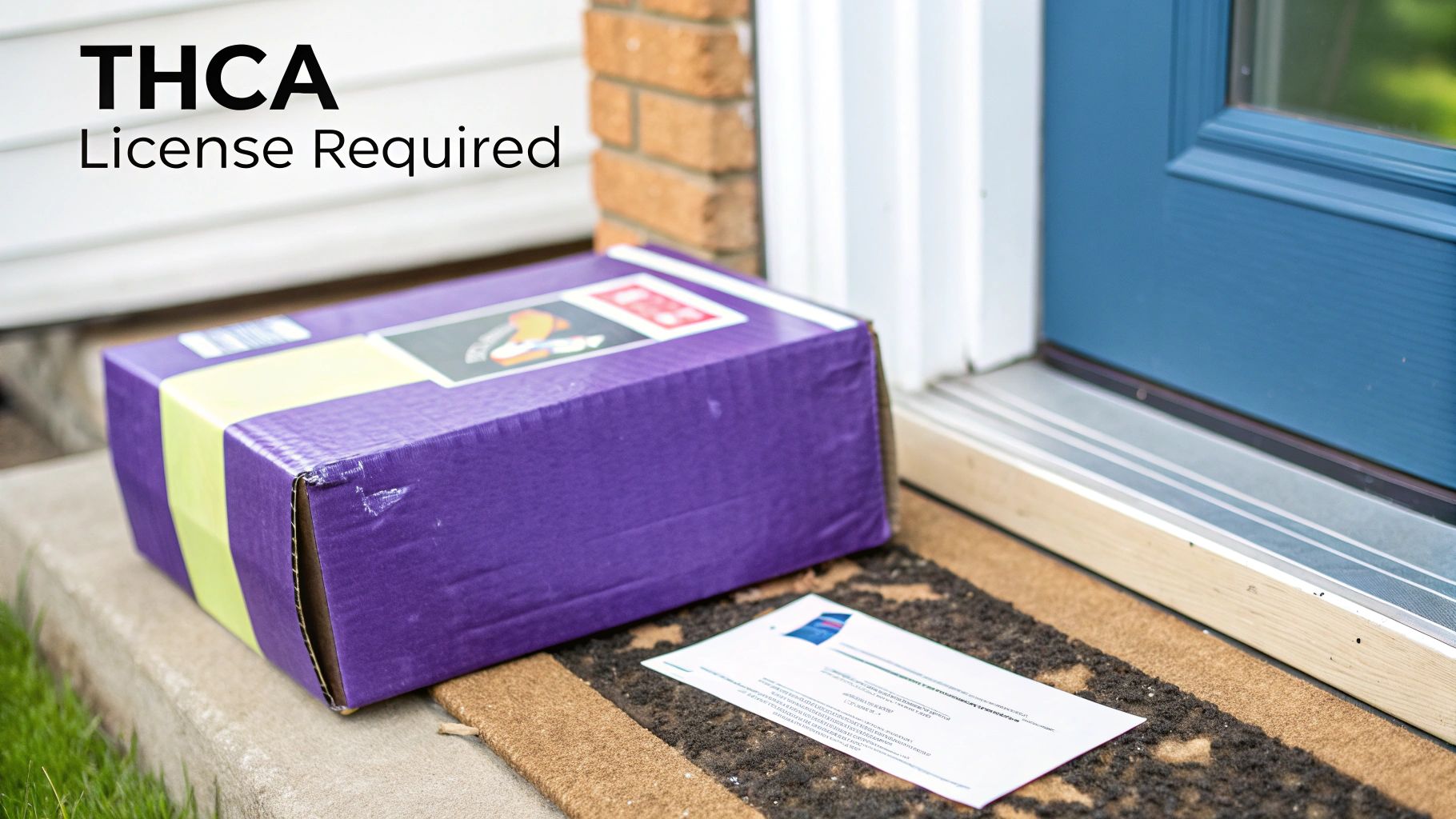
Of all the cannabinoids out there, Tetrahydrocannabinolic acid (THCA) is hands-down the most confusing for online sellers. Federally, it often lives in a legal gray area. As long as the Delta-9 THC content stays below the 0.3% threshold, it's considered hemp. But when you’re talking about shipping to Michigan, there’s no gray area at all—just a hard red line.
Michigan’s stance is crystal clear and leaves no room for interpretation. The state’s Cannabis Regulatory Agency (CRA) doesn’t look at THCA for what it is on the shelf; they regulate it for its potential. Since THCA converts directly into intoxicating Delta-9 THC with a little heat (a process called decarboxylation), the CRA classifies it as marijuana. End of story.
This one decision slams the door on any federal loopholes you might think exist. Your product can be labeled "federally compliant hemp," but the second its destination is a Michigan address, it’s subject to the state's tough marijuana laws.
No Loopholes, No Exceptions
For any e-commerce business, this means one thing: selling or shipping THCA products to a consumer in Michigan without a state-issued marijuana license is illegal. It makes no difference if your company is in California, Oregon, or Florida. If the package is headed to Michigan, their laws apply.
It works just like alcohol shipping laws. A winery in Napa can't just send bottles to any state it pleases; it has to follow the destination state's specific liquor regulations. The same principle is at play here. The CRA’s rules make any unlicensed, direct-to-consumer THCA sale into Michigan a prohibited activity.
Crucial Insight: Michigan law doesn’t differentiate between THCA and Delta-9 THC. Because one becomes the other, they are regulated identically. Any business wanting to sell THCA in Michigan must operate within the state-licensed cannabis system.
This approach is all about ensuring that any intoxicating cannabis product, no matter where it comes from, goes through the same rigorous testing, packaging, and age-verification process.
Real-World Scenarios Unpacked
To see how this plays out in the real world, let’s walk through a couple of common examples. Imagine an online hemp store, based out of state, that proudly sells "legal THCA flower" across the country.
- Scenario 1: The Out-of-State Retailer An online shop in Tennessee gets an order for THCA flower from a customer in Detroit. The retailer’s website claims the product is legal under the 2018 Farm Bill. But shipping that package into Michigan is a direct violation of state law because the seller does not hold a Michigan cannabis license.
Under Michigan law, that’s considered illicit trafficking. The fallout can range from law enforcement seizing the product to hefty fines and even criminal charges against the business owners.
- Scenario 2: The In-State CBD Shop A CBD and wellness shop in Grand Rapids decides to stock some THCA gummies it got from a national distributor. Even though the shop is physically in Michigan, it doesn't have a CRA-issued marijuana retail license. Selling these products is illegal, putting the business at risk of raids, product confiscation, and crippling penalties.
The table below breaks down the stark difference between operating with and without the proper credentials when it comes to CBD/Hemp/THCA shipping laws in Michigan.
Licensed vs Unlicensed THCA Shipping Scenarios in Michigan
This table illustrates just how critical a state-issued license is when dealing with THCA products destined for Michigan. The legal outcomes couldn't be more different.
| Scenario | Seller's Status | Shipping Legality in Michigan | Potential Consequence |
|---|---|---|---|
| An online store ships THCA flower from another state to a Michigan customer. | Unlicensed in Michigan | Illegal | Product seizure, fines, criminal charges. |
| A Michigan-licensed dispensary ships a verified THCA product to a local customer. | Licensed by the CRA | Legal | A compliant, tracked transaction. |
| A brick-and-mortar CBD store in Michigan sells THCA vapes. | Unlicensed in Michigan | Illegal | Store raids, fines, loss of business. |
The message from the CRA is unmistakable: intoxicating cannabinoids must flow through the state’s secure, seed-to-sale tracking system. Any attempt to sidestep this system will be met with serious enforcement, making compliance less of a best practice and more of an absolute necessity for survival.
Why Michigan's Cannabis Market Is So Strictly Regulated
To really get why Michigan is so tough on shipping hemp products, you have to look at the big picture. The state isn’t just throwing up roadblocks for fun. It’s actively defending one of the most successful and economically critical legal cannabis markets in the entire country. This isn't about restriction; it's about protecting a system that works.
The whole thing is built on the Michigan Regulation and Taxation of Marihuana Act (MRTMA), which voters passed back in 2018. This law did more than just legalize adult-use cannabis—it created the blueprint for a tightly structured, state-run industry. The primary goal was to build something accountable, safe for consumers, and profitable for the state.
At the center of it all is the Cannabis Regulatory Agency (CRA). Think of the CRA as the architect and the enforcer rolled into one. They handle everything from issuing licenses and checking for compliance to mandating safety tests for all products. This hands-on oversight has been incredibly effective at building a stable, legitimate market from the ground up.
A Market Worth Protecting
Michigan’s cannabis industry is no small-time operation; it's a multi-billion-dollar economic powerhouse. By creating a trusted and regulated space, the state has unlocked massive growth while keeping public safety front and center.
And that success is exactly why the state is so protective. With annual sales soaring into the billions, Michigan’s cannabis market pumps huge amounts of tax revenue directly back into its communities. This money isn't just disappearing into a general fund—it's paying for things people see and use every day. You can learn more about how Michigan's legal framework fuels its economy at indicaonline.com.
That tax revenue gets specifically divided up to fund:
- The School Aid Fund to support K-12 education.
- The Michigan Transportation Fund for fixing roads and bridges.
- Local Municipalities that host cannabis businesses.
This direct line from cannabis sales to public good gives the state a powerful reason to stamp out any unregulated competition that threatens to siphon money away from the system.
Innovation Inside the Lines
Don't mistake strict rules for a lack of innovation. Michigan's tight framework has actually channeled creativity, not crushed it. The state has been a pioneer in licensed cannabis delivery and has even approved social consumption lounges, proving it’s committed to growing the market—as long as it’s done within the established, controlled system.
By fostering a secure and licensed environment, Michigan encourages legitimate businesses to thrive while pushing unregulated sellers to the sidelines. This approach ensures that all products on the legal market meet strict safety and testing standards.
This is the key context for understanding the CBD/Hemp/THCA shipping laws in Michigan. The state's hard line on THCA isn't some random, arbitrary decision. It’s a logical and necessary piece of a much larger strategy designed to protect a system that is working incredibly well for its residents and its economy. Every single regulation is another brick in the wall that keeps the market’s integrity and safety intact.
Automating Your Shipping Compliance Strategy
<iframe width="100%" style="aspect-ratio: 16 / 9;" src="https://www.youtube.com/embed/o-ZNBUmyowg" frameborder="0" allow="autoplay; encrypted-media" allowfullscreen></iframe>Knowing the CBD/Hemp/THCA shipping laws in Michigan is one thing. Actually enforcing them on every single order is a whole other challenge.
Relying on manual checks is slow, notoriously prone to human error, and just won’t work as your business grows. All it takes is one wrong shipment to face seized products, unhappy customers, and some very expensive legal headaches. So, how do you protect your business without bringing your fulfillment process to a grinding halt?
You automate it. Modern e-commerce tools can act as a digital gatekeeper for your online store, automatically enforcing your shipping rules at checkout. This approach swaps tedious guesswork for reliable, automated precision, making sure every order is compliant before you even think about printing a label.
Creating a Digital Gatekeeper for Your Store
Imagine a system working tirelessly in the background, 24/7. This system already knows that THCA flower can't go to Michigan, that vape cartridges are off-limits everywhere because of the PACT Act, and that CBD topicals are good to go.
Tools like Ship Restrict are built to be this exact kind of gatekeeper. They plug directly into e-commerce platforms like Shopify or WooCommerce, letting you build specific rules based on what’s in the cart and where the customer wants it shipped.
For example, you could set up a simple rule: "IF the cart contains a product tagged 'THCA' AND the shipping address is in Michigan, THEN block shipping options and show a custom message." This simple logic stops a non-compliant sale in its tracks, protecting you and your customer. When setting up your rules, understanding complex guidelines like Hazmat shipping requirements can give you a solid framework for handling other regulated products.
The screenshot below shows just how easy it is to create these granular rules, blocking specific products from being shipped to certain states.
This kind of control is what allows you to ensure only compliant orders make it through checkout.
A Practical Example of Automated Compliance
Let’s walk through how this would work for a store selling a mix of hemp products. Using an automation tool, the owner can set up a few key rules and stop worrying about Michigan-bound orders.
- Tag Your Products: First, they’d go through their product catalog and add specific tags. All THCA flower gets tagged thca-restricted, while vape cartridges get tagged pact-act-restricted.
- Build a Michigan Rule: Next, they create a rule just for Michigan. This rule would block any shipment containing products tagged with either thca-restricted or pact-act-restricted.
- Let Compliant Products Through: Now, if a customer in Michigan orders only CBD oils or topicals (which have no restrictive tags), the system sees no conflicts and lets the order proceed without a hitch.
By automating these checks, you turn compliance from a daily operational headache into a one-time setup. You save countless hours, prevent costly shipping errors, and give your customers a clear, upfront experience by telling them about restrictions before they even check out.
This automated approach is hands-down the best way to manage the tricky CBD/Hemp/THCA shipping laws in Michigan. It gives you the confidence to scale your business while maintaining a strong defense against non-compliance, letting you focus on growth instead of constantly looking over your shoulder for regulatory changes.
Michigan Hemp & CBD Shipping FAQs
Trying to get a handle on Michigan’s CBD, Hemp, and THCA shipping laws? You're not alone. The rules can feel a bit tangled, so let's clear up some of the most common questions sellers have.
Can I Ship CBD Oils and Topicals to Michigan?
For the most part, yes. If your products are made from federally compliant hemp—meaning they contain less than 0.3% Delta-9 THC—you can generally ship them directly to customers in Michigan. This applies to things like oils, tinctures, and topicals.
The big exception? Vape products. But for standard CBD items, you’re usually in the clear. Just make sure your products have current Certificates of Analysis (COAs) handy and are clearly labeled to sidestep any shipping headaches.
How Does Michigan View THCA Compared to Delta-9 THC?
Here’s where it gets tricky. Michigan’s regulators see THCA and Delta-9 THC as essentially the same thing from a legal perspective. The state’s Cannabis Regulatory Agency (CRA) is focused on a product's potential to cause intoxication, and since THCA turns into Delta-9 THC when you heat it, they classify high-THCA products as "marijuana."
This means THCA flower and other similar products fall under the same heavy regulations as traditional cannabis. They can only be sold through Michigan's state-licensed dispensary system, not shipped directly to consumers from an out-of-state ecommerce store.
Key Takeaway: When shipping to Michigan, it's not just about the current Delta-9 THC level. The state looks at the total potential THC, which is why they regulate THCA so strictly.
Does the PACT Act Ban Apply if I Use FedEx or UPS?
Yes, it does. While the PACT Act is a federal law aimed at the USPS, its impact is much broader. Major private carriers like FedEx and UPS have created their own internal policies that mirror the federal ban on shipping vape products.
They've put a stop to shipping all hemp and cannabis vape products to residential addresses. This has created a near-total block on direct-to-consumer vape sales across the country, making it a nationwide problem that definitely includes Michigan.
Do Michigan Rules Apply to My Out-of-State Business?
They absolutely do. The moment you ship a product to a customer in Michigan, you’re playing by Michigan's rules. You can't legally send something like THCA flower from another state to a Michigan resident unless you have the proper Michigan-issued cannabis license.
Trying to bypass these state-specific laws is a huge gamble. It can lead to seized products, hefty fines, and legal battles that could put your entire business at risk.
Stop losing sales to shipping confusion. Ship Restrict automates your compliance with Michigan's complex rules, blocking restricted orders at checkout so you can ship with confidence. Get started at ShipRestrict.com.

Cody Yurk
Founder and Lead Developer of ShipRestrict, helping e-commerce businesses navigate complex shipping regulations for regulated products. Ecommerce store owner turned developer.